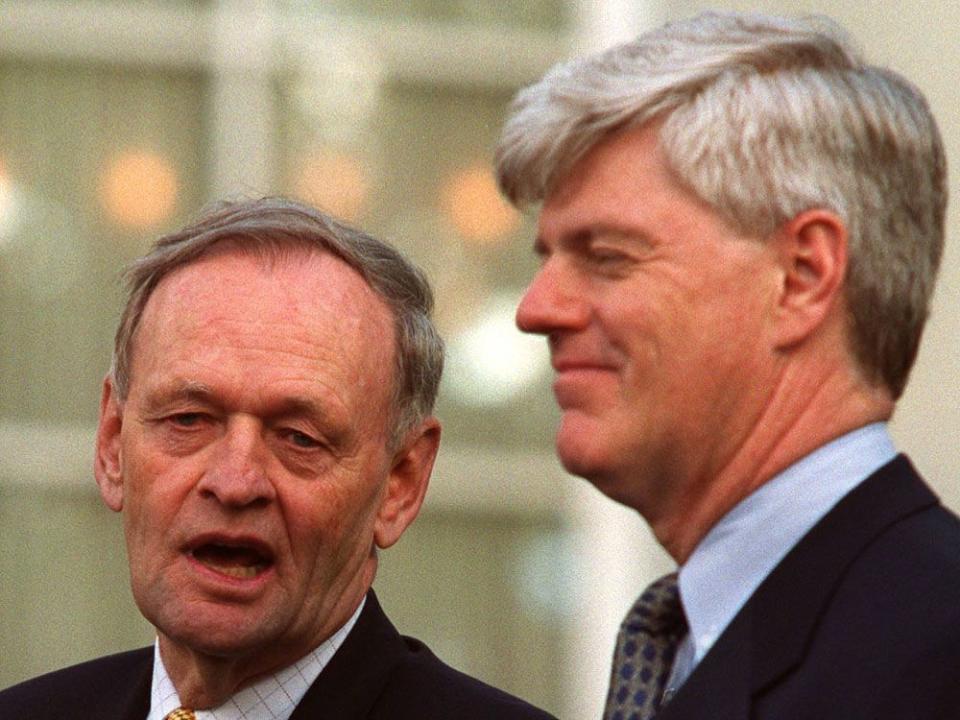Ottawa's spending is making the Bank of Canada's job harder: John Manley

Former finance minister John Manley joined a growing group of “business Liberals” who are voicing their concerns over the federal budget, saying he thinks Prime Minister Justin Trudeau’s fiscal policy is making it harder for the Bank of Canada to contain inflation.
Manley, who now serves as a senior adviser at law firm Bennett Jones LLP, said he agreed with former Bank of Canada governor David Dodge’s report last week that concluded federal deficits are not sustainable for the next 10 years.
However, the federal government continues to favour a path that tapers COVID spending, rather than quickly returning to something closer to a balanced budget. The extra fiscal stimulus — when the unemployment rate is near a record low — is stoking demand, and thus putting upward pressure on inflation. The Bank of Canada raised interest rates a quarter point last week despite an outlook that predicts economic growth will stall this year, because governor Tiff Macklem is concerned that cost pressures remain a threat.
“I think (David Dodge and I) would both agree that at the moment at least, it appears that fiscal and monetary policy are not aligned, and the importance of that alignment is key,” Manley said during an interview with BNN Bloomberg on Jan. 30.
“This is a bit like driving your car with one foot on the gas and the other on the brake generally, especially if there’s slushy conditions under your tires,” Manley added. “That’s not a good plan for controlling the direction of your vehicle, not a good plan for controlling the direction of the economy either.”
Other economic voices adjacent to the Liberal camp have raised similar concerns recently. Bill Morneau, who was Trudeau’s first finance minister, and former senior deputy governor Carolyn Wilkins, who was invited to brief the cabinet last week, have cautioned against added spending, stressing the need for prudence as the economic outlook darkens.
Dodge, who served as deputy finance minister under Jean Chrétien’s Liberal government, pointed to a recession, more fiscal spending and supply constraints as growing risks that could throw the federal government’s prudent budget plan off course.
When asked about what he hopes to see in the next federal budget, Manley said he’s looking for a change in mindset that prioritizes putting a lid on decades-high inflation and restoring confidence to the economy.
“They have to acknowledge that currently one of their biggest challenges in the economy is inflation and those inflationary expectations,” Manley said. “If they continue with the mindset that we’re still back three years at the beginning of a pandemic and it’s time to keep holding up the fire hose and spraying the money out just to keep everything going, then I think they’re going to fuel inflation rather than to resist it. I think over the longer term, that’s going to be a bad thing.”
Manley pointed to Argentina as a cautionary tale, which had consumer price figures jump 94.8 per cent year-over-year in December, the fastest pace of inflation the country has grappled with since 1991.
Friends of the Liberal government are adding to the pressure on Freeland to constrain spending
Why David Dodge thinks Ottawa's plans to restore fiscal balance are on shaky ground
Canada is a long way from that. Headline inflation was 6.3 per cent in December and most forecasts have it on a downward trajectory. But Manley’s point was to flag the dangers of what happens when inflationary expectations become entrenched.
“Businesses can’t plan in an inflationary environment, they’ve got to have some expectation that there’ll be price stability, and business capability to make investments relies on that kind of confidence as well,” Manley said.
The next federal budget is expected to be tabled sometime in the spring.
• Email: shughes@postmedia.com | Twitter: StephHughes95
